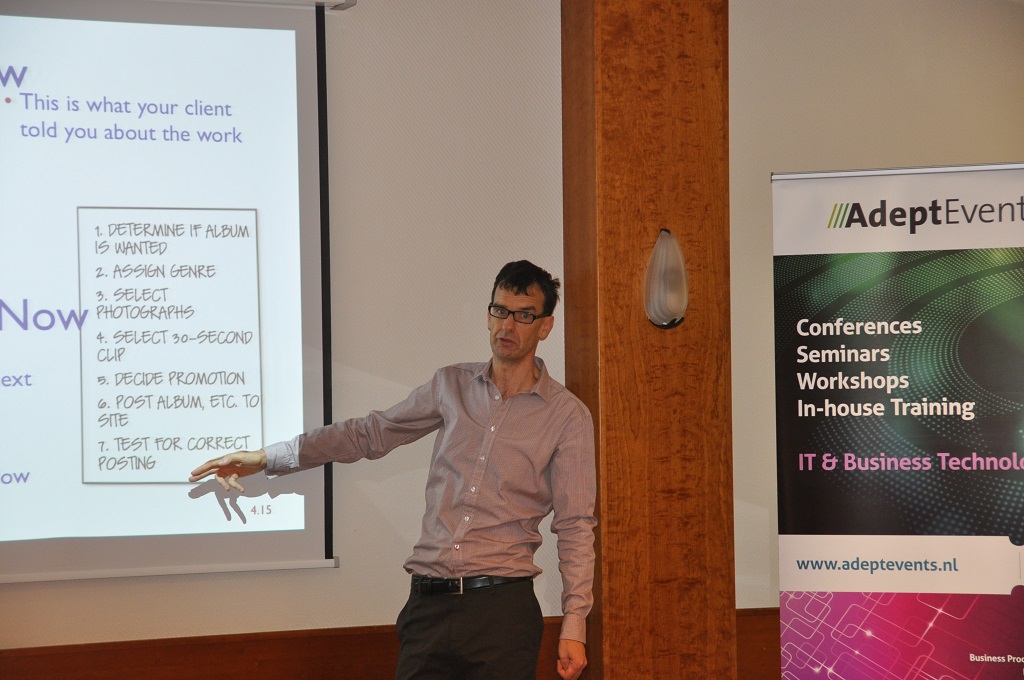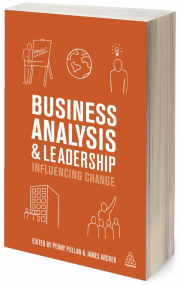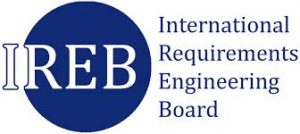Mastering Business Analysis
Business analysis underpins any automated system development, and any meaningful business change. Business analysis means uncovering the real business problem, and then crafting the best possible solution for it.
Business analysis means firstly bringing the stakeholders to a common — and correct — understanding of the value that any new solution will bring to the organisation.
Business analysis means investigating the business problem, discovering the essence — the real problem — and then looking at the options for an appropriate solution. In short, the task of the business analyst is to uncover the real business, and communicate it in such a way that all stakeholders come to a consensus on the best way to improve that business.
Business analysis is a combination of work study, systemic thinking, innovating, communicating, persuading and several other analytical skills. This course gives you the process and the tools for effective and thorough business analysis.
Learning objectives:
 By attending this two-day course you will learn:
By attending this two-day course you will learn:
- How to discover the realbusiness needs, not just guess at a solution
- How to improve the business
- How to define and analyse customer segments
- How to write a value proposition that clarifies the intention of the business change
- How to define a project so that it can yield real benefits, and have all stakeholders agree on the objectives
- How to be better at communicating and convincing people of your ideas and solutions
- How to be innovative and find the best way to improve your client’s business
- How to be a better business analyst.
Who should attend?
Business analysis is almost everyone’s job—every employee has some responsibility for effective business improvement. The most likely job titles you would find at this course are:
- Business Analyst
- Product Owner
- Systems Analyst
- Project Leader
- Requirements Engineer
- Product or Program Manager
or similar titles. We also find Business Stakeholders, Users and Software Customers benefit from learning advanced business analysis techniques, and how they can contribute to the organisation’s wellbeing.
Why attend?
Our businesses thrive or flounder on the effectiveness of their business processes, both automated and manual. Businesses with good processes provide a better service and are more responsive to their customers. The converse is also true.
Business analysis is the craft of enlightened improvement to business systems and processes. Moreover, business analysis gives you ways of identifying the areas where improvement projects will yield the highest value.
This two-day course in business analysis gives you the skills and tools to discover your client’s real business, and to determine and demonstrate the best ways of improving it.

This course is a natural companion to Mastering the Requirements Process, where we teach the art of requirements writing. The models and understanding produced by Mastering Business Analysis are the optimal input, and foundation for, your requirements process.
You receive a free copy of the book Business Analysis and Leadership: Influencing Change by Penny Pullan, James Archer et al.
Volere provenance
Volere was introduced in 1995. Since then, the Volere approach to requirements has been used by thousands of projects. These range from the conventional commercial domains such as banking, insurance, and so on, to more exotic areas such as air traffic control, aviation, automotive engineering, real-time control of appliances, telephony, and many more. The techniques were originally developed by James Robertson and Suzanne Robertson. Since their introduction, they have evolved as a result of research and application. James and Suzanne Robertson have continually introduced improvements as their clients have continued to push the requirements envelope.
Today, Volere is a trademarked brand owned by the Atlantic Systems Guild. There is a network of consultants, instructors and agents around the world that are available and qualified to help you get better value for your investment in requirements.
James Archer is an associate of the Atlantic Systems Guild. His wide ranging experience, admirable instructing skills and his ability to connect theory to practical examples make him one of the select people qualified to teach the Volere technologies.
James’s contribution to Volere is significant. James is a Master of Innovation having graduated with a distinction from the Innovation, Creativity and Leadership Masters from City University in London, which has led to significant participation in the Volere curriculum.
Moreover, James is one of the most approachable and knowledgeable people when it comes to discussing your requirements, business analysis and business change needs.
IIBA member discount
Courses are delivered by Atlantic Systems Guild, an IIBA Endorsed Education Provider (EEP), and IIBA trademarks are used under license and in accordance ![]() with IIBA’s Corporate Identity Standards and Trademark Policy.
with IIBA’s Corporate Identity Standards and Trademark Policy.
Members of the IIBA Dutch Chapter are eligible for 10 percent discount.
IREB
 The Atlantic Systems Guild is a recognised training provider of the International Requirements Engineering Board (IREB) for both the foundation level and the advanced level syllabi.
The Atlantic Systems Guild is a recognised training provider of the International Requirements Engineering Board (IREB) for both the foundation level and the advanced level syllabi.
Please note: the number of attendees is limited. Please register early!
At the top of this page you can download the PDF brochure of this workshop.
James Archer
The seminars and workshops that we offer as In-house will take place right at your office. Well in advance we will discuss the room requirements, especially in the case of workshops. If your organisation has widely dispersed offices we can also decide to run the workshop in a venue of your choice that is centrally located.
In-house Info
Practically all of our seminars and workshops can be offered as an In-house course for your company exclusively. We can tailor with extra focus on specific topics that apply to your organization. Also available in online format or in face-to-face format with live video stream.
RELATED EVENTS
Generative AI in Business Analysis
ChatGPT / CoPilot / Gemini for End-to-End Business Analyis Artificial Intelligence, undoubtedly one of the most ground-breaking technologies to date, is opening new doors for analysts with innovative tools and capabilities. OpenAI's ChatGPT, for example, can be applied in strategic, business and functional analysis in various ways. Hands-on workshop.
May 20, 2026
Utrecht
Working with Business Processes Masterclass
Aligning Process Work with Strategic, Organisational, and Cultural Factors This 3-day masterclass shows how to discover and scope a business process, clarify its context, model its workflow with progressive detail, assess it, and transition to the design of a new process by determining, verifying, and documenting its essential characteristics. Highly interactive workshop.
June 8-10, 2026
Utrecht
Cursus Sparx Enterprise Architect 16
Fundamentals and Best Practices Workshop hosted by Christian Gijsels on analyzing, modelling and simulation with the latest release of Sparx Enterprise Architect, version 16. Archimate, BPMN modelling, DFD, DMN, UML, including data modelling features.
Only available as In-house
At your office
Concept Modelling for Business Analysts
Making Data Modelling a Vital Technique This workshop by Alec Sharp introduces concept modelling from a non-technical perspective, provides tips and guidelines for the analyst, and explores entity-relationship modelling at conceptual and logical levels using techniques that maximise client engagement and understanding.
March 25, 2026 (half day)
Utrecht
Business-oriented Data Modelling Masterclass
Balancing Engagement, Agility, and Complexity This data modelling workshop by Alec Sharp covers Entity-Relationship modelling from a non-technical perspective, provides tips and guidelines for the analyst, and explores contextual, conceptual, and detailed modelling techniques that maximize user involvement.
June 1-3, 2026
Utrecht
